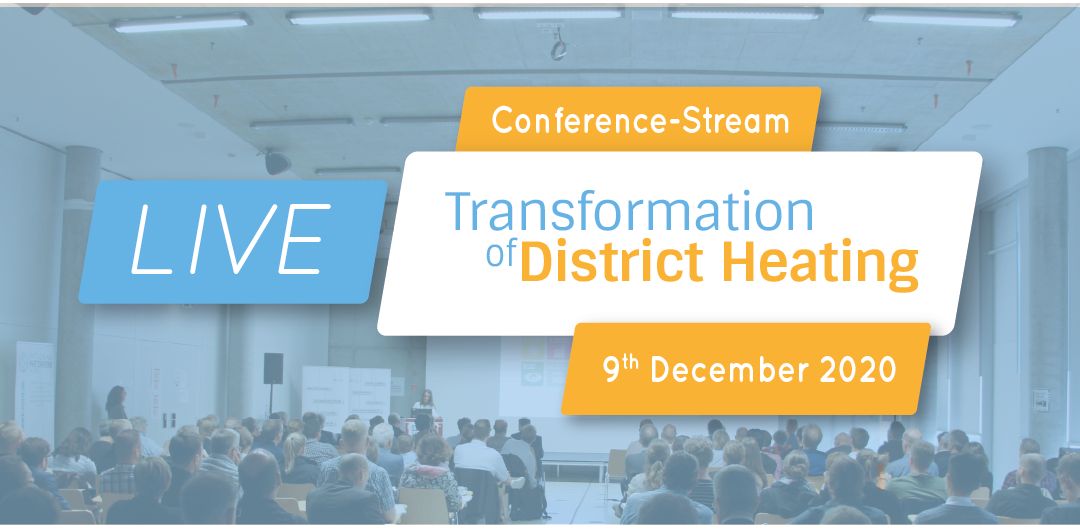Up to 140 experts from energy companies, suppliers, municipalities and science from all over Europe followed the livestream of the LowTEMP final conference. They took the opportunity to virtually discuss the potential and challenges of low-temperature district heating in an international setting. During the conference, the project partners presented the results of the Interreg BSR project LowTEMP and experts provided insights into the latest developments in the sector from a German and European perspective. The conference was organised by the host, the German Centre for Energy, Building, Architecture and Environment (ZEBAU GmbH), and the German Energy Efficiency Association for Heating, Cooling and CHP (AGFW), in close cooperation with aconium GmbH.
The participants were welcomed by Jens Kerstan, Senator for the Environment of the City of Hamburg, and representatives of the LowTEMP project partnership. Hamburg had originally been chosen as the venue, but the conference was held virtually due to the current restrictions. The presentation of Hamburg’s district heating strategy provided an interesting insight into the development of Hamburg’s district heating network and presented the city’s activities to make the heat supply more sustainable overall. Speaker Christian Maaß from Hamburg Institut Consulting emphasised the need to look at the system as a whole – from the heating network itself to distribution and storage through to the user, with whom good communication should be achieved. In his keynote speech, Dr. Ingo Weidlich, Professor of Infrastructure Technology at Hafen City University, outlined the opportunities and challenges for district heating systems as well as the current state of research into new materials and the sometimes very different standardisation within Europe. Gabriele Pesce from Euroheat & Power then gave a keynote speech on how low-temperature district heating systems are already contributing to energy efficiency in Germany and the Baltic Sea region and how the need to modernise low-temperature district heating systems is reflected in current strategies and initiatives of the European Commission. Following on from the opening presentation by lead partner Adam Cenian (IMP PAN) and project manager Britta Schmigotzki (aconium GmbH) on the past, present and future of work in the LowTEMP Interreg project, the project partners presented the results of three years of cooperation in LowTEMP in the afternoon. A series of guidelines, strategies and instruments for the planning, implementation, financing and management of low-temperature district heating systems were developed, which can contribute to a sustainable energy supply in the partner countries. They are now available on the LowTEMP website. The knowledge platform for district heating and the LowTEMP training package were developed to meet the great need for expertise and capacities in the field of “sustainable and future-oriented district heating systems”. The project results are intended to help build regional and local capacities to achieve a climate-friendly heat supply with reduced emissions in the Baltic Sea region. Providing expertise while building capacity will continue to play an important role in the future: as part of LowTEMP 2.0, an extension of the current LowTEMP project, the partners will work on further improving the training package to respond to the great need for knowledge on sustainable district heating supply. The existing training package will be adapted to national conditions and flanked by regional seminars. In order to achieve better dissemination, the content will also be made available as eLearning courses. The eLearning courses are being developed by aconium GmbH. Funding has been approved by the Interreg Baltic Sea Region programme for 2021. The partners met the day after the final conference to kick off LowTEMP 2.0.
Background:
The LowTEMP project is supported by the European Union (European Regional Development Fund and European Neighborhood Instrument) under the Interreg Baltic Sea Region Programme 2014-2020. Interreg enables transnational cooperation to tackle common challenges that do not stop at national borders, such as rising CO2 emissions. The LowTEMP project partners come from Poland, Germany, Denmark, Sweden, Finland, Estonia, Lithuania, Latvia and Russia. The project contributes to the objectives of the EU2020 strategy by promoting energy efficiency, the use of renewable energy sources and the reduction of CO2 emissions. It also supports the objectives of national and European spatial development policies and the EU Strategy for the Baltic Sea Region (EUSBSR). aconium GmbH developed the project on behalf of the lead partner IMP PAN (Institute of Fluid-flow Machinery, Polish Academy of Sciences) and is responsible for project, financial and communication management.

